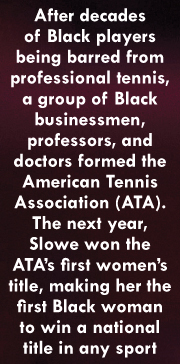
Naomi Osaka’s recent victory at the Australian Open, which made her one of only seven players, male or female, to earn four Grand Slam titles, solidifies her role as the clear heir to Serena Williams’s throne. And both champions, in consistently lending their voices to fighting gender discrimination and systemic racism, are perhaps unknowingly continuing the legacy of the first Black woman to ever win a national tennis title, Lucy Diggs Slowe.
Slowe lived a life that merits much greater acknowledgement than what our society has seen fit to extend to her. Her achievements include being an influential educator, an activist, and a founding member of the US’s first Black Greek-lettered sorority.
After decades of Black players being barred from professional tennis, a group of Black businessmen, professors, and doctors formed the American Tennis Association (ATA).
The next year, Slowe won the ATA’s first women’s title, making her the first Black woman to win a national title in any sport.
Fought for education reform
 Despite her athletic gifts, Slowe concentrated her efforts on higher education, eventually becoming Howard University’s dean of women — the first Black woman to hold that position at any American college. She fought for education reform and used her influence to promote racial equity, a prominent role for Black women in the women’s suffrage movement, and peace activism. She also helped organize the National Council of Negro Women and helped found the National Association of College Women, serving as its first president.
Despite her athletic gifts, Slowe concentrated her efforts on higher education, eventually becoming Howard University’s dean of women — the first Black woman to hold that position at any American college. She fought for education reform and used her influence to promote racial equity, a prominent role for Black women in the women’s suffrage movement, and peace activism. She also helped organize the National Council of Negro Women and helped found the National Association of College Women, serving as its first president.
Perhaps the most enduring feature of her legacy is her role in bringing to fruition the nation’s first Greek-lettered sorority for Black women, Alpha Kappa Alpha (AKA). As an undergraduate student, Slowe was one of the organization’s founding members and served as its first president. Under Slowe’s leadership, the sorority made clear its commitment to improving the material conditions of its community members, specifically Black women.
Women’s suffrage
The AKAs advocated for women’s suffrage, worked to eradicate lynching, and assisted at the Freedman’s Hospital. Later, during the Great Depression, the sorority contributed to the betterment of education in rural areas, and the group sponsored job training and youth programs during the civil rights movement. Community service programs remain a cornerstone of the organization today.
Slowe racked up this impressive catalog of accomplishments while navigating sexism and Jim Crow-era racism. She became a tennis champion when the color line was strictly enforced, worked as a teacher in segregated school systems, and struggled against Howard University’s first Black president, who refused to give her fair pay because she was a woman.
These biases are still very present for today’s Black women tennis champions. Although Serena Williams doesn’t live in a world where Black players are banned from mainstream competition, she’s been no stranger to racist and sexist attacks from tennis spectators and the media. That hasn’t dissuaded her from using her platform and voice to support social justice movements.
Even when tennis legend Billie Jean King suggested she take a step back from her activism to focus on the final years of her career, Williams responded unambiguously: “The day I stop fighting for equality and for people that look like you and me will be the day I’m in my grave.”
In 2016, Williams’s first tweet after advancing to the Wimbledon final wasn’t about tennis; it was an expression of outrage over the death of Philando Castille, a Black man who was shot and killed by a Minnesota police officer during a traffic stop. When asked by reporters about her comments, she used the spotlight of her Wimbledon news to take aim at systemic racism and police brutality.
